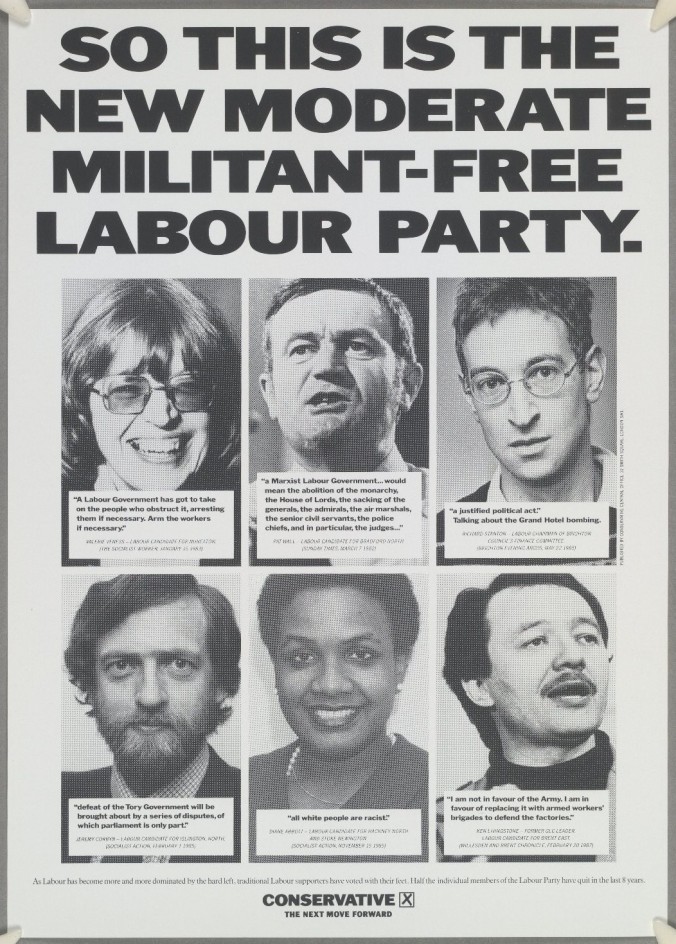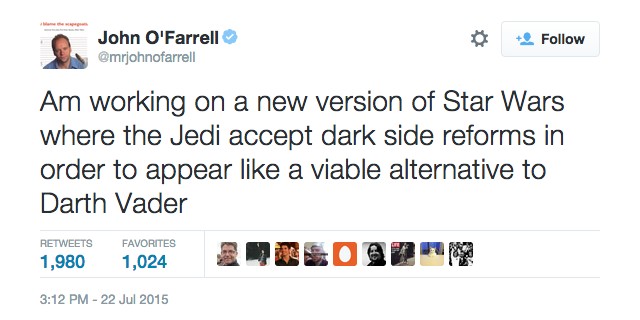In the last days, the Labour mainstream has not so much fallen as fully leapt into a fit of apoplexy. The cause an opinion poll – by no means solid, by no means a guarantee of future stock value – placing Jeremy Corbyn as the likely winner of the party’s leadership contest. Labour MPs, some now publicly flagellating themselves, nominated Corbyn for a ‘balanced debate’, but apparently couldn’t countenance that it might actually lead anyone to, you know, debate. Corbyn’s moment of popularity is thus sketched as, among other things, “the emotional spasm…an apocalyptic tendency”. John McTernan – a prime mover in the utter implosion of Labour in Scotland – was invited to hold forth on national TV as an oracle nevertheless, where he showed off his great talent in persuasion by calling Labour supporters “morons”. John Rentoul, that other great passé hack, thought recognising the left-wing appeal of the SNP as a factor in Labour’s defeat was like believing in space lizard conspiracy theories.
There was an equal portion of patronising bullshit to go with the name-calling. “Do some research” before you dare to a preference, chided Anne Perkins. Don’t be a “petulant child”, admonished Chuka Umunna. Sunny Hundal came at logic with customary cack-handedness, transforming the clear articulation of principles into a pathology. These are some of the same people who bemoan the detachment of politicians from real people, the decline in party membership, and so on, only to rise up as vengeful furies when a candidate dares to stir energies. All down to an unsavoury populism, natch. This, says Helen Lewis, is ‘purity leftism’, nothing like the necessary compromises of opposition, where you have to be bold enough to endorse 2% defence spending (something “the public” indeed likes, although hardly top of their polled priorities). Blair, of course, can only relate in the terms of triangulation, regurgitating the 1990s whilst pretending to the terrain of the future.
It doesn’t matter that Corbyn’s record is one of social democracy (remember that?). It doesn’t matter that there are trends in his favour. It doesn’t matter that his economic policies are comparatively bold and redistributive. It doesn’t even matter that many of Corbyn’s policies are popular. One line of Blair’s intervention was widely cited: “I wouldn’t want to win on an old fashioned leftist platform”. Few completed the quote: “…even if it was the route to victory“. This is not political argument, nor even Machiavellian electoral planning, but the tantrum-jitters of the self-appointed aristocracy. Having passed out lectures on loyalty and collective responsibility on Monday during the second reading of the Welfare Bill, the dauphins were by Thursday pre-declaring a coup should Corbyn win and practically spitting on their own activists besides. They saw no contradiction. Labour’s experts advocate not political communication but political manipulation, impersonating the enemy to take their place in our collective consciousness.
And so it will go on if any of the appeasement candidates win. Unable to articulate an actual politics, or to truly break the left/right distinction they so often argue doesn’t even exist (it is all just ‘aspiration’ and ‘values’ and ‘modernisation’), Labour will continue to concede ground, including that won by Blair and Blairism. “Listening to the electorate” (properly speaking, a very narrow portion of the electorate taken by the political class to be decisive for 2020) will mean not seriously opposing further restrictions on trade union rights, not contesting welfare cuts, not arguing for public investment or social justice, not responding to draconian terrorism legislation, not defending immigrants from demonisation and exclusion, not promoting sensible investment in universities, not contesting privatisation or unbridled financial power, &c. Never mind that austerity is damaging lives and fails basic tests of economic competence: Miliband’s loss can only be interpreted as necessitating further sacrifices to austerity fetishism.
Blair and company argue that the Tories crave a Corbyn win, but the trap has been set a move beyond that: Cameron and Osborne can rest confident that the terror of electoral wipe-out will have a neo-Blairite Labour party galloping towards their position anyway. Always fighting the last war, and on a badly-chosen battlefield. The Labour mainstream cannot adapt to new parameters, cannot think except in the abjection of the spectre of a hard left, even as they appoint themselves the true custodians of the world-to-come. Having failed to stand up to claims that over-spending caused the financial crisis (it was the allocation decisions of deregulated market actors, since you ask), and having joined in the anti-immigration mood with some vigour (if also with occasional cognitive dissonance), the party is hardly placed to offer a local vision of political renewal, still less muster anything like internationalism or a novel settlement for the great questions of the age (stagnant economies, spreading inequalities, humanitarian crisis within and at the gates of Fortress Europe, a foreign policy that does not undermine itself even in the narrow range of national interest, some possible trajectory for expanded human freedom and comfort). They have only platitudes, and this explains in part the bile of the anti-Corbyn moment. Utterly unable to engage on the merits, theirs is also a retreat to a ‘comfort zone’, one of personality-engineering and fickle non-policies, desperate to catch the eye of the floating voter who hates them for their indecision and rightly perceives the abyss of their purpose.

As Paul Mason argued the morning after the election, this emptiness is the result of some longer-term trends:
[Labour] in its current form it has almost no ideological base, or coherence. Miliband’s inner team had almost no outriders in the press, no co-thinkers in academia; they had support among artists and film directors, but always half-hearted. Blairism, of course, has massive support among the now wrinkled and pensioned ex-ministers and former giants of 1990s journalism, but that’s not much use… It has failed to account for its defeat in 2010, failed to recognise the deep sources of its failure in Scotland, and failed to produce any kind of intellectual diversity and resilience from which answers might arise.
The failure goes on, and is only compounded by the shrill denunciations, as if Corbyn’s suggestion of opposing tax cuts for the rich in a time of austerity was the common sense definition of “hard left”. This is how the Overton Window works. To have Labour advisors ripping into mild social democracy as if it was the establishment of a command economy is to shrink the possibilities across the entire political spectrum. This is not reorientation to “the centre”. Nor is it moving past left and right. It is establishing the axioms of the right as the very horizon of politics, and then calling it objective reality. We live in a society in which something like re-nationalisation of the railways is a hugely popular policy, even (by a slimmer margin) amongst Conservative voters, and in which no one is able to seriously propose it. Mary Creagh thinks this is a sign of good sense (re-nationalisation apparently unworkable, a stone age notion). But – and here we must concede something to the ‘Mont Pelerin of the Left’ crowd – you have to contest political reality in order to create it. Arguments, organisation, persuasion. Not submission and mimicry (at least not at the scale of the Blairite panic). Or else they win even when you win.
Anti-Corbynites will at this stage justly complain that all of the above misses the central, inescapable, terrifying point: a party leader must be able to win nationwide parliamentary elections, and winning is predicated on capturing new voters, who will mostly be swing electors of no particular ideology and not some shy gaggle of hardcore Bennites in hiding since 1997. And it is winning that requires a range of skills in coalition-building, in political manoeuvrability, and in crafting a narrative which is both suitably empty (so that all positions can be contained within it) and robust (so that there is a narrative identity to hawk). Principles, a strong voting record, repeatedly being proven right in the face of prevailing credulity, loyalty to the historic role of the party, a refreshing honesty, basic decency in talking about opponents: all of that is secondary, or worse. Denying the need for these competencies is thus an infantile leftism, a retreat, a fantasy, a comfort-eating binge (as if there was anything comfortable about being set upon so within Labour’s putative broad church).
Although it can obviously not be admitted explicitly, such advice counsels that the electorate are idiots, and should be treated as such. Grow up, and realise that this is a game of manipulation in the pursuit of power, not open debate in the service of public good. In the intricacies of political advertising, vapid talk is a feature, not a bug, and yes, it too reflects the alliances made with interest groups in the market and the media. For now, there can only be charisma-void candidates, who may at least be relied on not to actively repulse in the marginals. What else did you expect? As so many have noted for so long, the consequence is an endless dilution of ideas (of what might once have been haughtily thought of as political theory) in which power is its own reward, and a light balm the best the body politic might hope for even in the event of a grand Labour victory. This is, you will notice, the opposite of how the Tories have carried on. They use their position to remould the state, and in ways that are pretty obviously “right wing”. It is hard to imagine that anyone but Corbyn has the political courage to do the same for the left, but then they are not expected to, and no positive case exists to be put for them (apart from that Burnham believes in the NHS, which is, I guess, some kind of comfort). What, say, is the identifiable meaning of Yvette Cooper?

Still, let us return to the case against Jez. Being popular on the left, even in much of the country, is not the task at hand. Increasing Labour vote shares in areas where millions have left the party is irrelevant if you don’t capture the much smaller number of people in swing seats. This is indeed so, and the design flaw-feature of first-past-the-post elections, the system that will be operative in 2020. The trap is not one recently cobbled together by George Osborne, but one that Labour has set for itself, a failure inherent in the success of Blairism. The Tony Trick cannot be pulled again anytime soon. Certainly, Corbyn is “old left”, and there is baggage aplenty to go with that, but the lack of a vibrant new left candidate is a direct result of decades of internal suppression of alternatives, and the external disconnect from social movements that Paul Mason remarks on, a disconnect which those who oversaw the steady decline of Labour actively sought.
In that sense, voting for Corbyn will clearly not resolve Labour’s world historic state of contradiction. Leaving aside the declared intention of frontbenchers and big hitters to actively undermine the democratic will of their own party, the Corbynite ascendancy may yet deliver a range of positives: greater public engagement, explicit discussion of redistributive policies, a change in pace and style that might confound the Tory comms machine, an elected front bench “of all the talents”, and a chance to stem Labour’s decline in Scotland. This last point – for all the denialism of figures like Rentoul – is fundamental. If Labour decides to cede Scottish voters entirely (and what a thing for a nominally unionist grouping to surrender), it only redoubles its Southern problem. It simply cannot win over enough voters in England, even if it commits the ultimate seppuku of becoming more right-wing than the Tories (some Blue Labour nationalist monstrosity, a hideous graft of drudgery to provincialism). As John Curtice – only our preeminent psephologist – has shown, without getting something back from the insurgent SNP, Labour would likely need a 12.5% lead over the Tories to achieve a majority in 2020. Not gonna happen folks. It is one remarkable feature of the anti-Corbyn avalanche that none of his detractors has been able to address this electoral fix directly. And if electability is your sole agenda, you’re pretty screwed with this lot anyway, given their currently mediocre levels of general popularity.
It is indeed unlikely that Corbyn would achieve anything more than a slight rejuvenation of a left-inclined Labour, and any defeat (whether self-inflicted by the Blairites or arising from his own failings) will redouble the chorus cry of no alternative. But it is a fundamental misreading to think the challenge can simply be avoided by handing the dispatch box to one of the pre-anointed. Leadership elections are about saying one thing to win over your party, and then saying something completely different to “the country” (or some similar nebulous proxy for swing voters). It is no revelation to say that most Labour MPs are not true democrats. Certainly – whatever the membership card says – only a tiny proportion are within sniffing distance of socialism. But Corbyn supporters have figured it out, are tired of being played and taken for granted. They can see that the exploitation of their political efforts, and the extent to which they will be asked to argue for policies that they find repugnant, will only increase with the ‘centrist’ strategy. And they have been put on notice accordingly: there will be no compromise with Corbyn’s platform, and unchecked aggressors within will do all they can to strangle his project at birth. And so the possibility of a more permanent divorce – those whispers of pasokification – becomes palpable.
Ultimately, it is Labour’s “mainstream” that is entryist – always counselling complicity and manipulation and an endlessly deferred radicalism. They are terrified by the influx of registered supporters who back Corbyn, a broadening and active group that they want to just go away, far preferring a narrow electorate of ideologues. Yes, these are new voters who have more in common with Syriza and Podemos than with Alan Milburn, and who – if they reached majority around or after Iraq – have never voted Labour before. But don’t you get that the Labour party is not for you? While it is the Corbynites who are cast as “insular”, their disposition is anything but. Their arguments against austerity and Tory policy are clear and long-standing, and are made in the name of a much wider swathe of the population that those ‘aspirationals’ who are the constant subject of cringe-inducing overtures on the tele. By contrast, figures like Creagh offer platitudes like “when we turn our back on the electorate, they turn their backs on us”, posing as if above politics itself, merely responding to a General Will. The relationship between even the most generic ‘left’ in this country and the Labour mainstream that claims to represent it has become openly abusive. The wound can surely be sutured, and the politic fever of this past week suppressed in the name of unity and a formless ‘opposition’ terrified of opposing. It is not at all clear that that would be a better result in the long-run than the dissolution (and remaking) of the party itself, should this lot continue to run its affairs.
Call that immaturity if you like, but everyone’s got to kill the parents in their head sometime.


Reblogged this on oshriradhekrishnabole.
LikeLike
I absolutely love this. You write beautifully. I also happen to agree with your sentiments, which helps with the appreciation.
Great piece.
LikeLike
Pingback: Existential danger: Labour, the left, and why Jeremy Corbyn must not win | shaunjlawson
Reblogged this on alittleecon.
LikeLike
For a good summary of the insane savaging of Corbyn by the media see http://medialens.org/index.php?option=com_acymailing&no_html=1&ctrl=url&urlid=4757&mailid=348&subid=9142
LikeLike
Reblogged this on Britain Isn't Eating.
LikeLike
Reblogged this on sanshistory and commented:
Great portrayal of a significant moment in British leftism
LikeLike
Pingback: The Corbyn Effect | Repeater Books